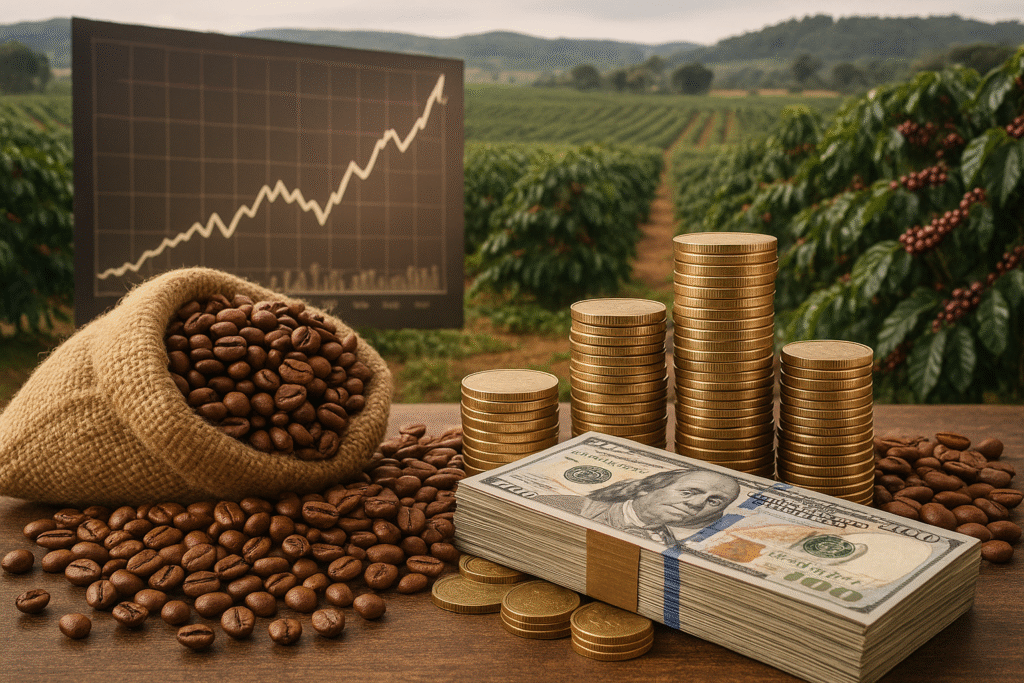Coffee is more than just a beverage that wakes us up on lazy mornings. It is one of the most important products in international trade, generating billions of dollars every year and directly impacting the lives of millions of people around the world. In this article, we’ll explore how coffee affects the global economy, from farm production to the financial market.
The Importance of Coffee in International Trade
Today, coffee is the second most traded commodity in the world, second only to oil. It is estimated that more than 125 million people depend on coffee production for their livelihood, especially in developing countries.
The global coffee market exceeds 100 billion dollars annually, involving every step in the supply chain: planting, harvesting, processing, exporting, roasting, and final sale to the consumer.
The Leading Coffee-Producing Countries
Global coffee production is led by tropical countries, with highlights including:
- Brazil: the largest producer and exporter of coffee in the world.
- Vietnam: leader in Robusta coffee production.
- Colombia: famous for high-quality Arabica beans.
- Ethiopia: considered the birthplace of coffee.
These countries rely heavily on coffee as a source of income and employment. In many cases, coffee exports represent a significant portion of their GDP.
Social and Economic Impact in Producing Regions
Coffee production is vital to the rural economy of many nations:
- It generates millions of direct and indirect jobs, especially for small farmers.
- It promotes the development of entire communities in remote areas.
- It encourages investment in infrastructure, such as roads and rural electrification.
However, economic dependence on coffee also makes these regions vulnerable to international price fluctuations and climate change.
Coffee in the Financial Market
Coffee is traded on commodity exchanges such as the Intercontinental Exchange (ICE) in New York and the Futures Markets in London. Coffee prices are highly volatile and influenced by:
- Weather conditions (frosts, droughts, hurricanes).
- Plant diseases (like coffee leaf rust).
- Political and economic issues in producing countries.
- Exchange rate fluctuations and interest rates.
Many producers and buyers use futures contracts to protect themselves from this volatility, ensuring more stable prices.
The Growth of the Specialty Coffee Market
The specialty coffee market has revolutionized the global industry. More demanding consumers are willing to pay extra for high-quality beans, which drives:
- Improved agricultural practices.
- Certifications such as Fair Trade and Organic.
- Socio-environmental sustainability initiatives.
This market segment values small producers and promotes the production of coffees with unique characteristics, such as fruity or chocolatey notes.
Industry Trends and Innovations
In recent years, new trends have shaped the coffee economy:
- Single-origin coffees: emphasizing the origin and terroir.
- Alternative brewing methods: such as Aeropress, Chemex, and Cold Brew.
- Sustainability: consumers seek coffee with less environmental impact.
- Technology: use of AI to monitor plantations and forecast harvests.
These innovations not only add value to the product but also open the door for new businesses and international partnerships.
Future Challenges
Despite its economic importance, the coffee industry faces major challenges:
- Climate change: threatens to significantly reduce suitable growing areas.
- Price drops: at times, coffee prices fall below production costs.
- Social pressure: workers on coffee farms often face poor working conditions.
Solutions involve public policies, international agreements, and consumer awareness about the origin of the coffee they drink.
Final Thoughts: A Bean That Moves the World
Coffee is, without a doubt, a global economic engine. It connects farmers in remote villages to major consumer cities, generates wealth, transforms cultures, and drives innovation.
Reflecting on coffee’s impact on the global economy reveals that every cup holds a complex web of social, financial, and environmental connections. Choosing quality, responsibly sourced coffee is not just an act of pleasure — it’s a way to contribute to a fairer, more sustainable economic chain.
